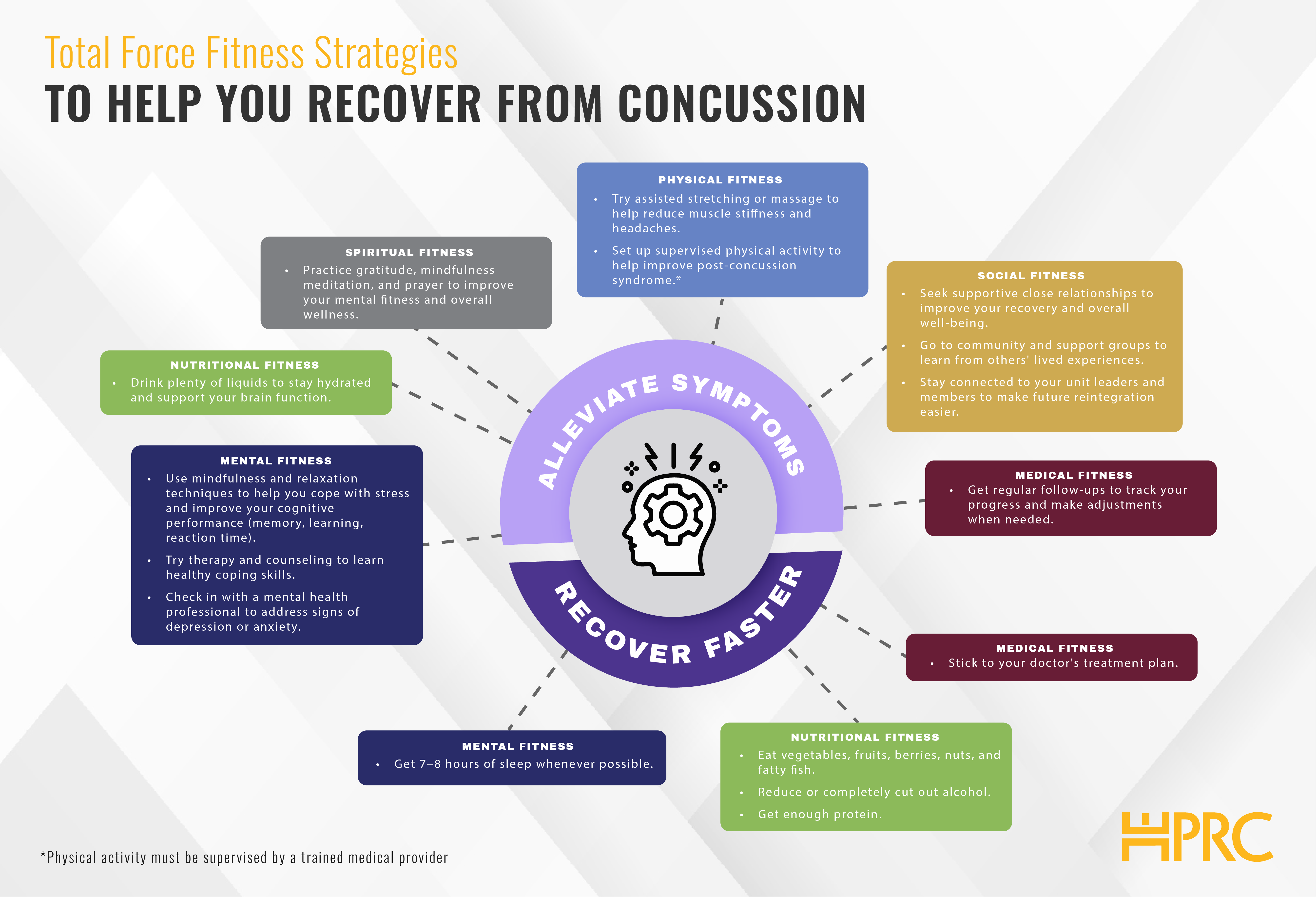Concussions are mild traumatic brain injuries that don't typically result in obvious damage but can have lasting effects. If you had a concussion, Total Force Fitness (TFF) strategies can improve your well-being and help you recover faster. TFF is a holistic framework with many interconnected areas that support health, wellness, and performance. Check out the infographic below to learn TFF strategies that can help ease concussion symptoms and speed recovery.

Horizontal page with a hub and spoke design. The hub’s circle in the middle is divided in half such that the top half of the circle says, “Alleviate symptoms” and the bottom half of the circle says “Recover faster.”
Six rectangle-shaped blocks serve as the “spokes that are examples of “TFF strategies to help you overcome concussion” that emerge from the “Alleviate symptoms” section. From 9 o’clock to 3 o’clock, clockwise, the examples are as follows:
Mental fitness
- Use mindfulness and relaxation techniques to help you cope with stress and improve your cognitive performance (memory, learning, reaction time).
- Try therapy and counseling to help you learn healthy coping skills.
- Check in with a mental health professional to help identify signs of depression or anxiety.
Nutritional fitness
- Drink plenty of liquids to stay hydrated and support your brain function.
Spiritual fitness
- Practice gratitude, mindfulness meditation, and prayer to improve your mental fitness and overall wellness
Physical fitness
- Try assisted stretching or massage to help reduce muscle stiffness and headaches.
- Set up supervised physical activity to help improve post-concussion syndrome*.
Social fitness
- Seek supportive close relationships to support your recovery and improve your overall well-being.
- Go to community and support groups to help you feel understood and learn from others' lived experiences.
- Stay connected to your unit leaders and members to make future reintegration easier.
Medical fitness
- Get regular medical follow-ups to help you track your progress and adjust treatment when needed.
Under the bottom half of the circle, 3 rectangle-shaped blocks serve as the examples of “TFF strategies to help you overcome concussion” for “Recover faster.” From 9 o’clock to 3 o’clock, counterclockwise, they are as follows:
Mental fitness
- Get 7–8 hours of sleep whenever possible.
Nutritional fitness
- Eat foods like vegetables, fruits, berries, nuts, and fatty fish.
- Reduce or completely cut out alcohol.
- Get enough protein.
Medical fitness
- Stick to your doctor's treatment plan.
Published on: September 25, 2024
References
Abdullah, M. I., Ahmad, A., Syed Saadun Tarek Wafa, S. W. W., Abdul Latif, A. Z., Mohd Yusoff, N. A., Jasmiad, M. K., Udin, N., & Abdul Karim, K. (2020). Determination of calorie and protein intake among acute and sub-acute traumatic brain injury patients. Chinese Journal of Traumatology, 23(5), 290–294. doi:/10.1016/j.cjtee.2020.04.004
Acabchuk, R. L., Brisson, J. M., Park, C. L., Babbott-Bryan, N., Parmelee, O. A., & Johnson, B. T. (2021). Therapeutic effects of meditation, yoga, and mindfulness-based interventions for chronic symptoms of mild traumatic brain injury: A systematic review and meta-analysis. Applied Psychology, Health and Well-being, 13(1), 34–62. doi:10.1111/aphw.12244
Caron, J. G., Benson, A. J., Steins, R., McKenzie, L., & Bruner, M. W. (2021). The social dynamics involved in recovery and return to sport following a sport-related concussion: A study of three athlete-teammate-coach triads. Psychology of Sport and Exercise, 52, doi: 10.1016/j.psychsport.2020.101824.
Chang, R. C., Singleton, M., Chrisman, S. P. D., Giza, C. C., Cuneo, A. Z., Murinova, N., Broglio, S. P., McCrea, M., McAllister, T. W., Sharma, T. L., & CARE Consortium Investigators (2024). Postinjury alcohol use is associated with prolonged recovery after concussion in NCAA athletes. Clinical Journal of Sport Medicine: Official Journal of the Canadian Academy of Sport Medicine, 34(1), 30–37. doi:10.1097/JSM.0000000000001165
Cheever, K., McDevitt, J., Phillips, J., & Kawata, K. (2021). The role of cervical symptoms in post-concussion management: A systematic review. Sports Medicine, 51(9), 1875–1891. doi:10.1007/s40279-021-01469-y
Clark, J.E., Sirois, E. (2020). The possible role of hydration in concussions and long-term symptoms of concussion for athletes. A review of the evidence. Journal of Concussion, 4. doi:10.1177/2059700220939404
De Luigi, A. J., Bell, K. R., Bramhall, J. P., Choe, M., Dec, K., Finnoff, J. T., Halstead, M., Herring, S. A., Matuszak, J., Raksin, P. B., Swanson, J., & Millett, C. (2023). Consensus statement: An evidence-based review of exercise, rehabilitation, rest, and return to activity protocols for the treatment of concussion and mild traumatic brain injury. PM & R: The Journal of Injury, Function, and Rehabilitation, 15(12), 1605–1642. doi:10.1002/pmrj.13070
Devore, E., Morgenlander, A., Krucoff, C., & Morgenlander, J. (2023). Yoga and mindfulness intervention for concussion recovery. International Journal of Yoga Therapy, 33(2023), doi:10.17761/2023-D-21-00074
Feinberg, C., Dickerson Mayes, K., Jarvis, R. C., 3rd, Carr, C., & Mannix, R. (2023). Nutritional supplement and dietary interventions as a prophylaxis or treatment of sub-concussive repetitive head impact and mild traumatic brain injury: A systematic review. Journal of Neurotrauma, 40(15-16), 1557–1566. doi:10.1089/neu.2022.0498
Finnegan, E., Daly, E., & Ryan, L. (2024). Nutritional considerations of Irish performance dietitians and nutritionists in concussion injury management. Nutrients, 16(4), 497. doi:10.3390/nu16040497
For a complete list of references, contact HPRC@usuhs.edu.
